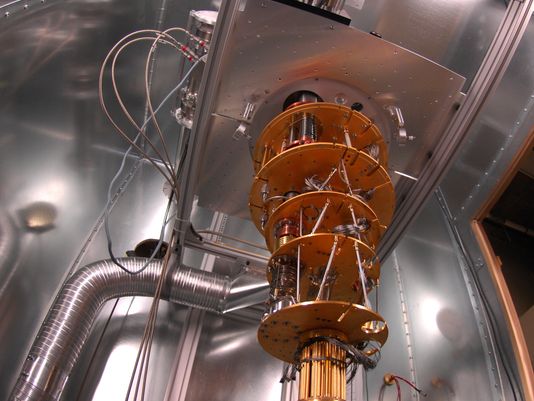Uncertainty fading from quantum computer?
"Quantum" computers offer advantages over today's microprocessors, in theory, because of uncertainty about what's what on the atomic level.
But some of the uncertainty about one quantum computer appears to be fading on the real world level with the purchase this week of a second "D-Wave Two" quantum computer, announced Thursday[1] by a consortium of NASA, Google and the Universities Space Research Association.
And tests of computer made by the Canadian quantum computing company, D-Wave of Burnaby, British Columbia, might help explain that purchase.
"On one of the tests we have run, it is faster, much faster," said computer scientist Catherine McGeoch of Amherst (Mass.) College, who announced the results [2]at a computer science meeting on Thursday. "Roughly 3,600 times faster than its nearest competitor."
A quantum computer takes advantage of a principle in physics that on the atomic scale particles can be in many places at once or have multiple properties such as magnetism or an electrical charge simultaneously. They would store data in these multiple positions at once unlike conventional computers which only store one value or data point in their circuits at a time.
For two decades, researchers have pondered how quantum computers might speed up calculations that even today's most powerful computers have trouble with such as quickly recognizing shapes, calculating complex wind patterns around new jets or determining what routes to send fleets of delivery trucks to save time and money in real time. The Google-led consortium will tackle "machine learning" techniques, where the computer teaches itself to recognize shapes, as a primary focus.
In the test conducted by McGeoch and Cong Wang of Canada's Simon Fraser University, she pitted a D-Wave Two computer chip against against three conventional computing approaches to solving these "optimization" problems. Optimizing basically requires determining what path or solution to a many-faceted problem minimizes or maximizes its pay-off. And quantum computers such as the D-Wave Two could in theory do this much faster. In the tests, it did do better on one kind of problem, but only as well as conventional computers on two other optimization questions.
The Google-led consortium will tackle "machine learning" techniques, where the computer teaches itself to recognize shapes, as a primary focus with its D-Wave Two.
So does the purchase and the test result mean D-Wave has a genuine quantum computer, a question hotly-debated in the computer science field? After all, the problem tackled in the test on which it excelled is one the machine was designed to crack, a problem related to the famous "travelling salesman problem" which tries to figure out the optimal route for a traveler to take to minimize his travel time between towns. The more towns you add to the problem the longer it takes a conventional computer to crack and the better a quantum computer -- which can consider many solutions to a problem at once -- should do.
"For me, it is just a chip that I plug into the computer, essentially," McGeoch says, expressing uncertainty on the question. "I can only tell you how fast it went."










